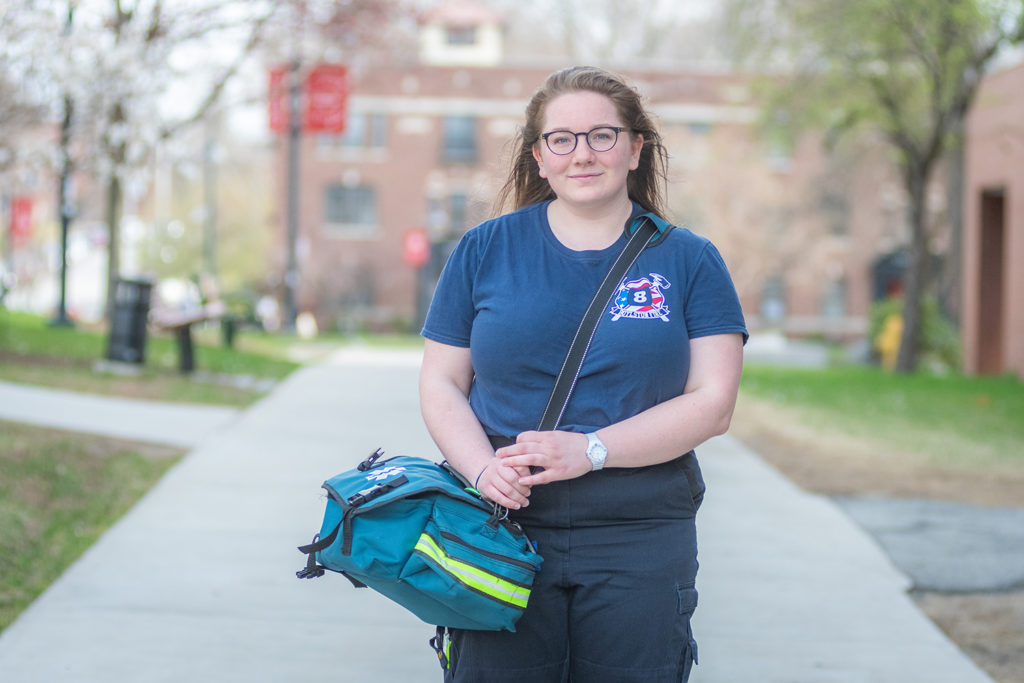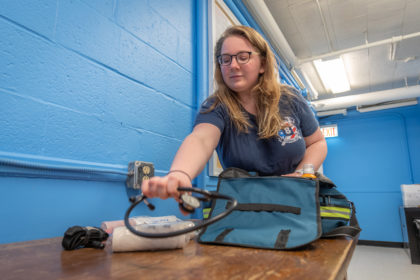Clark education, EMT work prepare Becca Nash for a career in patient care

Rebecca “Becca” Nash ’19 remembers responding to her first car accident as an emergency medical technician. The experience affirmed for her the value of helping someone weather a traumatic situation.
Nash, a biology major with a concentration in health, science, and society, expects to be helping many more people as she pursues a career as a physician assistant. She was recently accepted into the PA graduate program at the Massachusetts College of Pharmacy and Health Sciences.
Nash currently works as an EMT with the Boylston Fire Department. On campus, she’s a member of Clark University Rapid Response (CURR).
Below, Nash reflects on her commitment to emergency care, her career plans, and her Clark experience.
What do you like best about being a student at Clark?
I think there is a strong sense of community at Clark. I’ve never felt like I was competing with other students in my classes, but instead that we were all working toward the same goal. People will study with you, or help you understand a point you missed when reading a paper — no questions asked.
What drew you to choose your major?
I came into Clark on the pre-med track, so biology made the most sense as it lined up with a lot of the courses I was required to take. I’ve since switched to the physician assistant track but kept the bio major because I found the classes interesting and enjoyable. I have a concentration in public health, which I elected to pursue to expand my knowledge of health care beyond just patient care.
How have you applied your learning in the real world?
One of the most important things I’ve learned at Clark is that every one of my patients is coming from a different place in life, and it is not my job to judge how or why they’ve ended up in my care. People’s access to care is influenced by a myriad of factors I would have never considered before I took classes like Sociology of Medicine. My concentration has helped me develop more empathy for patients and their unique situations.
How have your faculty advisers helped you?
The late professor David Thurlow was so helpful when deciding which courses would best enable me to pursue PA school. I’m forever grateful for his patience and guidance. Professor Denis Larochelle was also incredibly supportive and helpful during this journey.
Professor Charles Jakobsche’s Chemistry and Biology of Medicine was one of the most useful and interesting classes I’ve taken here at Clark. I learned so much about how medicine actually works within the human body, which I plan to apply to my future career. Professor Deborah Merrill is also an inspiration to me. Where Professor Jakobsche taught the practical side of medicine, Professor Merrill taught the sociological side. I think knowing the mechanism of medicine and understanding the unique perspectives with which each patient approaches health care and medicine goes hand in hand in providing high-quality patient-centered care.

What are some of your extracurricular activities?
Clark Rapid Response takes up a large amount of my free time. I joined my sophomore year, and in the spring enrolled in the EMT course sponsored by the club. I got my license and have been on the E-Board for the last two years as the personnel coordinator and then the education coordinator.
I’ve been able to do the patient care I love, both at school and in the jobs I was able to obtain through earning my EMT license. To me, CURR has been like a family. I’ve met some of my closest friends through the club and have become more confident in myself not only as a medical provider but as a leader. It’s been fun and challenging, frustrating, and exciting, and as cheesy as it sounds I wouldn’t trade the years I’ve spent on it for anything.
What are your plans after graduation?
I’m enrolled in the physician assistant program at Massachusetts College of Pharmacy and Health Sciences Worcester, which starts in January 2020. I would love to work in rural medicine, especially with rural fire departments and ambulance services to find ways to increase the survival rates for critical patients who are long distances from their closest health care facility.
How has your time at Clark played a role in achieving your goal?
Clark offers a wide array of unique classes that provided me with not only the biological knowledge required to be a solid provider, but also the sociological perspectives to consider with each patient. Also, without Clark University Rapid Response I may not have earned my EMT license and wouldn’t have been able to accrue the patient care hours necessary for PA school admission.
Tell us about your work as an EMT.
I work for the Boylston Fire Department. We’re a 911 service, so we respond to any emergencies within the town, and often do mutual aid to surrounding towns as well. As EMTs, we provide all patient care for any emergency we encounter. This could include anything from taking vitals to bandaging wounds to giving medications for overdoses and diabetic emergencies. It also involves driving the patient-loaded truck safely in any conditions. I love the work because it’s fast-paced and exciting; every call is different, and trying to figure out what is going on with your patient without much in the way of diagnostic equipment poses a unique challenge. I like knowing the work I do has a direct impact on my patients, and that without us some would not receive the interventions they need to survive.
I’m also the education coordinator for Clark’s Rapid Response. This position involves running all of our training, coordinating classes with the Worcester ambulance company MedStar and Worcester Polytechnic Institute (WPI), running new-member orientation, and testing all members.
What were skills that you learned at Clark helped you excel?
The leadership and confidence I learned from working on CURR has helped me become a better EMT. I’ve learned how to control a scene, but also how to control my reaction to whatever is happening during a particular call. In an emergency situation, someone has to take charge, and having those leadership skills allows me to do that if need be.
What was the most compelling thing to you about your work/project(s)?
Just knowing that I’m directly helping people makes the job worth it for me. The work I do has a direct impact on their health, and it’s a really nice feeling to know that you’re helping someone else on what is possibly one of the scariest days of their life.
Describe the most memorable moment you had working.
The most memorable experience was my first car accident. I just remember the tones went off around 4 in the morning and I went into automatic mode. There’s a checklist for what you have to do: Put on your shoes, get in the ambulance, sign on the radio, etc. It helped me recognize that I do have the skills to help patients with traumatic injuries in stressful conditions, and it was one of the first times I felt confident about the actions I took during a call, which is a good feeling to have.


